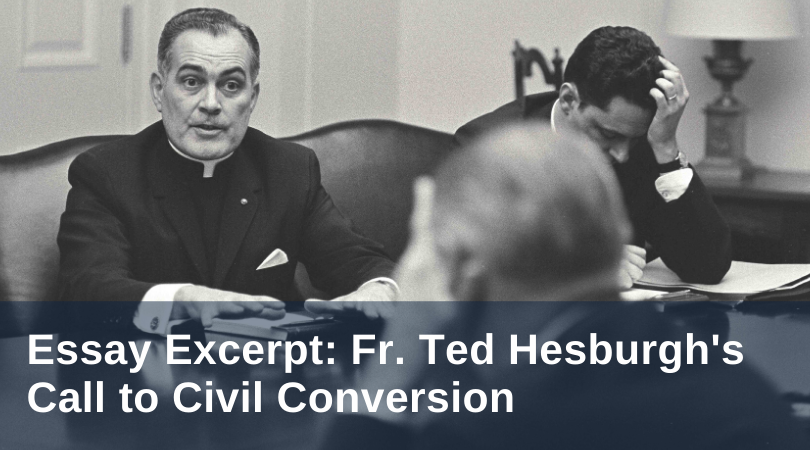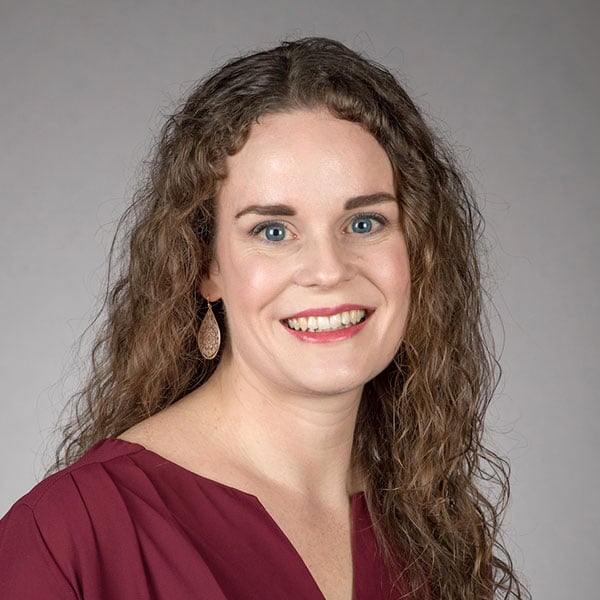
Fr. Theodore Hesburgh, C.S.C. (1917–2015), known affectionately by the Notre Dame community as Fr. Ted, served as President of the University of Notre Dame from 1952 until 1987. A highly respected servant leader, Hesburgh served as a member of the United States Civil Rights Commission, beginning in 1957. Throughout the 1960s, he continued to advocate strongly for civil rights, speaking at a rally in Chicago in 1964 organized by Dr. Martin Luther King, Jr., an event that has been immortalized in an iconic photo of Hesburgh and King standing side by side, amid other activists, hands joined, singing “We Shall Overcome.”
The McGrath Institute’s academic publication, Church Life Journal (our sister publication), recently published an address given by Fr. Ted at a Civil Rights Conference sponsored by Notre Dame’s Law School on February 4, 1960. The entire essay is well worth reading, especially now, for it brings to light the grave injustices that have been perpetuated against the black community in particular. Hesburgh speaks primarily about resolving the racist treatment of black Americans when trying to register to vote, but his comments resound on a more universal level, too.
These past few weeks have brought me face-to-face with my own unacknowledged biases, and as a white Catholic, I realize how far short I have fallen in loving my neighbor as myself, let alone loving my neighbor as Christ loves each and every person. White Catholics throughout the United States, throughout the world, must see this time as a call to conversion, a call to live more fully into our identity as disciples of Jesus Christ, and to continue his mission of building up the Kingdom of God on earth by working to uphold the inherent dignity of every human being, for all have been created in the image and likeness of God (see Genesis 1:26).
May we be guided by the Gospel and inspired by Fr. Ted’s words of wisdom:
This is not a Democratic or a Republican issue. . . . What we are discussing today should be as non-partisan as any spiritual or moral issue facing America. We seek only one end—that all Americans are on equal footing in their participation in the civic order. We must use all of our brains and all of our compassion to find a solution, and that solution must not be tricky in a legal sense, but be as simple as our belief that all men are created equal and that all men are entitled to vote in this country. We must take appropriate, firm, solid, simple means toward that end. . . .
. . .when it comes to civil rights, if you so much as meet another human being in the course of your life, and all of us meet many, then you cannot be uncommitted to this problem. This is not the kind of problem about which a person can be detached. Because of the fact that you walk down a street, or live in a neighborhood, or work in an office, or get on a bus, or talk to anyone, you are involved in this problem and you must take a stand.
EDITORIAL NOTE: This essay excerpt is used here by the kind permission of the University of Notre Dame Archives, all rights reserved. We are grateful to Head of the University Archives, Angela Fritz for her collaboration.
Featured image: Fr. Theodore Hesburgh, C.S.C. meets with members of the Civil Rights Commission; Source: LBJ Library Digital Collection via Wikimedia Commons; PD-US Government.



